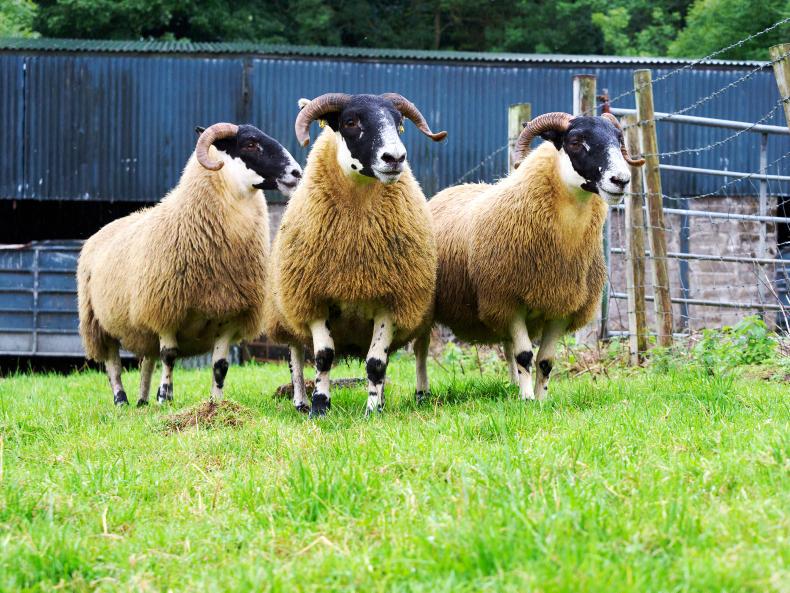Mary Doherty and her 15-year-old daughter Eimear Curran work together on their pedigree sheep enterprise in Muff, Co Donegal. Farming for over 25 years, Mary shares more than a farm with her daughter, as the two maintain a fantastic work ethic and love of all things rural.
Eimear’s flock of Glackmore Blackfaces run alongside her mother’s Northview Blackfaces. The flock of over 200 ewes is made up of 50 Lanark and 150 modern Perth-type purebreds. Much of Mary and Eimear’s work is in preparing their pedigree flocks for nationwide shows and sales, at which they continue to triumph.
As Mary and Eimear’s dad Brian separated some years ago, Eimear also works with her dad on his separate enterprise with a flock of almost 600. Mary also works three days a week at a home décor store and seven days on her rented acreage.
No novice
Growing up on a mixed farm with sheep and cattle with five sisters and one brother means that Mary is no novice farmer.
“Maybe it is just how I was brought up, but there was only one boy in our house and he was the youngest so Daddy had all of us girls out helping with hay, potatoes, sheep or cattle. Whatever it was, you were out there in the middle of it,” she recalls.
Eimear, too, was born and raised a shepherd. “She was due in December, in lambing time. So, she literally spent the first three or four months of her life in the shed in her buggy. It did her no harm. I think it worked because she was always a sheep woman,” Mary laughs. “We have been doing it all our lives – it’s just second nature to us.”
The challenges
The challenges that Irish farming women face have never affected Mary or Eimear’s farming careers. At just 15, however, Eimear recognises the inequalities.
“It’s like everything else – a wee bit biased. You could put it into football terms: boys’ matches are seen as way more important than girls’ matches and it’s not fair. It’s made out that the men do all the hard work and the woman is just in the background but that’s not it,” she says.
Mary agrees, adding; “Long ago it was only the man who went to the mart – I go to the mart myself now, as well as the sales and the shows and bring my sheep out. The jeering still happens sometimes. I might have been embarrassed by that 10 years ago but not at all now.”
As avid members of the Tir Conaill Scotch Blackface sheep group, Eimear and Mary have worked hard to be top-class shepherds. The much talked of physical strain of lambing, dosing and dipping doesn’t outweigh the final sense of achievement though.
“They are no sooner lambed until you have to bring the lambs in to be dosed again. It’s a constant work cycle. When you look at them at this time of the year though, you see your achievements in your show winners. You have to look at the bigger picture and take the good with the bad,” they concur.
This solid and reliable mother-daughter team keep each other on their toes, as Eimear continues.
“We work together but because I work with Daddy too, we have separate teams at the shows,” she says.
“We kind of compete when It comes to showing, isn’t that right Eimear?” Mary smiles. The 365-day workload is divided evenly, from scanning, feeding and diet plans, to lambing and sheering, according to Mary.

The 365-day workload is divided evenly, from scanning, feeding and diet plans, to lambing and sheering. \ Clive Wasson
“Come lambing time it is all systems go for about six weeks,” she says. “We try to take turns: someone up at night and the other in the morning. In a way it is the worst time because everyone is on top of each other and the housework is coming down. But you get through it every year.”
Proud of her daughter’s work ethic, Mary is confident in handing over the reins. “Eimear is very capable and one thing I learned this year is that she is able to do far more than she thinks herself. You don’t have to come back and check her work. She knows her sheep and knows if something is off. If you leave her on her own and come back, everything is 100%. It’s just common sense to her.”
Plans for the future include a flock expansion for Mary, while Eimear hopes to complete a degree in veterinary or agricultural science and a lengthy stint of work in Scotland.
Their advice is practical as the two prepare for yet another season of sales: “Experience is hard to beat. So go and work on a farm before you decide anything. Getting to know other women that are out there doing it helps. Our women in farming group or even reading articles gives women an opportunity to learn how others do it and how they cope with challenges. It is hard work and it is expensive, but if you enjoy it, you will never stop learning and improving,” Mary concludes.
Check out Tir Conaill Scotch Blackface Sheep Breeders on Facebook to keep up with Eimear and Mary’s farming year. For some friendly farming advice and support, find the North West Women in Farming Facebook page.
Read more
Women in ag: Breaking the mould
Nollaig na mBan: celebrating women in agriculture
Mary Doherty and her 15-year-old daughter Eimear Curran work together on their pedigree sheep enterprise in Muff, Co Donegal. Farming for over 25 years, Mary shares more than a farm with her daughter, as the two maintain a fantastic work ethic and love of all things rural.
Eimear’s flock of Glackmore Blackfaces run alongside her mother’s Northview Blackfaces. The flock of over 200 ewes is made up of 50 Lanark and 150 modern Perth-type purebreds. Much of Mary and Eimear’s work is in preparing their pedigree flocks for nationwide shows and sales, at which they continue to triumph.
As Mary and Eimear’s dad Brian separated some years ago, Eimear also works with her dad on his separate enterprise with a flock of almost 600. Mary also works three days a week at a home décor store and seven days on her rented acreage.
No novice
Growing up on a mixed farm with sheep and cattle with five sisters and one brother means that Mary is no novice farmer.
“Maybe it is just how I was brought up, but there was only one boy in our house and he was the youngest so Daddy had all of us girls out helping with hay, potatoes, sheep or cattle. Whatever it was, you were out there in the middle of it,” she recalls.
Eimear, too, was born and raised a shepherd. “She was due in December, in lambing time. So, she literally spent the first three or four months of her life in the shed in her buggy. It did her no harm. I think it worked because she was always a sheep woman,” Mary laughs. “We have been doing it all our lives – it’s just second nature to us.”
The challenges
The challenges that Irish farming women face have never affected Mary or Eimear’s farming careers. At just 15, however, Eimear recognises the inequalities.
“It’s like everything else – a wee bit biased. You could put it into football terms: boys’ matches are seen as way more important than girls’ matches and it’s not fair. It’s made out that the men do all the hard work and the woman is just in the background but that’s not it,” she says.
Mary agrees, adding; “Long ago it was only the man who went to the mart – I go to the mart myself now, as well as the sales and the shows and bring my sheep out. The jeering still happens sometimes. I might have been embarrassed by that 10 years ago but not at all now.”
As avid members of the Tir Conaill Scotch Blackface sheep group, Eimear and Mary have worked hard to be top-class shepherds. The much talked of physical strain of lambing, dosing and dipping doesn’t outweigh the final sense of achievement though.
“They are no sooner lambed until you have to bring the lambs in to be dosed again. It’s a constant work cycle. When you look at them at this time of the year though, you see your achievements in your show winners. You have to look at the bigger picture and take the good with the bad,” they concur.
This solid and reliable mother-daughter team keep each other on their toes, as Eimear continues.
“We work together but because I work with Daddy too, we have separate teams at the shows,” she says.
“We kind of compete when It comes to showing, isn’t that right Eimear?” Mary smiles. The 365-day workload is divided evenly, from scanning, feeding and diet plans, to lambing and sheering, according to Mary.

The 365-day workload is divided evenly, from scanning, feeding and diet plans, to lambing and sheering. \ Clive Wasson
“Come lambing time it is all systems go for about six weeks,” she says. “We try to take turns: someone up at night and the other in the morning. In a way it is the worst time because everyone is on top of each other and the housework is coming down. But you get through it every year.”
Proud of her daughter’s work ethic, Mary is confident in handing over the reins. “Eimear is very capable and one thing I learned this year is that she is able to do far more than she thinks herself. You don’t have to come back and check her work. She knows her sheep and knows if something is off. If you leave her on her own and come back, everything is 100%. It’s just common sense to her.”
Plans for the future include a flock expansion for Mary, while Eimear hopes to complete a degree in veterinary or agricultural science and a lengthy stint of work in Scotland.
Their advice is practical as the two prepare for yet another season of sales: “Experience is hard to beat. So go and work on a farm before you decide anything. Getting to know other women that are out there doing it helps. Our women in farming group or even reading articles gives women an opportunity to learn how others do it and how they cope with challenges. It is hard work and it is expensive, but if you enjoy it, you will never stop learning and improving,” Mary concludes.
Check out Tir Conaill Scotch Blackface Sheep Breeders on Facebook to keep up with Eimear and Mary’s farming year. For some friendly farming advice and support, find the North West Women in Farming Facebook page.
Read more
Women in ag: Breaking the mould
Nollaig na mBan: celebrating women in agriculture











SHARING OPTIONS